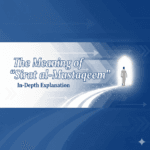The human quest for knowledge is as old as humanity itself. From the moment Adam (AS) was taught the “names of all things” as mentioned in the Quran.
And He taught Adam the names – all of them. Then He showed them to the angels and said, “Inform Me of the names of these, if you are truthful.”
(Al−Baqarah 2:31)
The pursuit of understanding has been a cornerstone of our existence. But for a Muslim, this pursuit is not merely an intellectual exercise; it is a sacred duty, a path to drawing closer to the Creator. The Holy Quran, revealed as a complete guide for humanity, is filled with verses that underscore the profound importance of acquiring knowledge. It presents knowledge not as an end in itself, but as a means to a greater end: understanding Allah, appreciating His creation, and living a life of purpose and righteousness.
If you want to explore the Quranic perspective on education for women, read our detailed blog on “What does the Quran say about women’s education?” for deeper insights.
This blog post will delve into the Quranic teachings on knowledge, exploring the various dimensions of “ilm” (knowledge) and its role in the life of a believer.
The First Commandment: Read!
The very first word revealed to Prophet Muhammad (PBUH) was “Iqra,” meaning “Read” or “Recite” (Al−Alaq 96:1). This powerful command didn’t just instruct the Prophet to read the words of the revelation; it was a universal call to all of humanity to seek knowledge.
The verse continues,
“Read in the name of your Lord, Who created – created man from a clinging substance. Read, and your Lord is the most Generous, Who taught by the pen – taught man that which he knew not”
(Al−Alaq 96:1-5).
This revelation establishes several fundamental principles:
- The command to read is absolute: It is not limited to religious texts but encompasses all forms of beneficial knowledge.
- Knowledge is a gift from Allah: We are taught what we did not know.
- The pen is a symbol of knowledge: It represents the preservation, transmission, and accumulation of learning.
This initial revelation set the tone for the entire Islamic faith, placing the pursuit of knowledge at its very core. Those who wish to master Quran reading can benefit from Najam Academy’s Online Quran Classes, designed for learners of all levels.
The Status of Those with Knowledge
The Quran consistently elevates the status of those who possess knowledge. It draws a clear distinction between the learned and the ignorant, posing a rhetorical question that serves as a powerful reminder of the value of knowledge:
“Say, ‘Are those who know equal to those who do not know?'”
(Al-Zumar 39:9).
This verse emphasizes that knowledge is a key differentiator, a means of intellectual and spiritual elevation. It’s not just about accumulating facts; it’s about the deep understanding that leads to wisdom, humility, and a greater appreciation of Allah’s creation.
In another powerful verse, Allah states:
“Allah will raise those who have believed among you and those who were given knowledge, by many degrees. And Allah is All-Aware of what you do.”
(Al−Mujadila 58:11).
Here, faith and knowledge are intertwined as the two primary qualities that lead to a higher rank with Allah.
For those who prefer learning from home, “How to Learn Quran with Tajweed at Home” offers practical guidance to improve recitation and understanding step by step.
Knowledge as a Path to Allah (SWT)
The Quran teaches that true knowledge is not just about the physical world; it is a means of recognizing Allah’s signs and His power. The universe itself is presented as a book of signs (ayat) for those who think and ponder.
Consider the verses that invite reflection on the natural world:
“Indeed, in the creation of the heavens and the earth and the alternation of the night and the day, there are signs for those who are of understanding.”
(Al-Imran 3:190)
“And He has subjected to you whatever is in the heavens and whatever is on the earth – all from Him. Indeed, in that are signs for people who give thought.”
(Al−Jathiyah 45:13).
Those eager to study the Quran in detail can explore Najam Academy’s Quran Online Classes to understand these divine signs with the help of expert teachers.
The Etiquette and Purpose of Knowledge
The Quran also lays down a framework for how knowledge should be sought and used. It warns against intellectual arrogance and the misuse of knowledge.
- Humility:
The story of Prophet Musa (AS) and Al-Khidr (Al−Kahf 18:60-82) is a profound lesson in humility. Musa (AS), despite being a great prophet, was told,
“Be patient with me until I inform you of its interpretation.”
(Al−Kahf 18:70)
This teaches us that there is always someone more knowledgeable than us, and the true seeker of knowledge must remain humble and open to learning.
- Beneficial Knowledge:
The Quran emphasizes seeking beneficial knowledge. The Prophet (PBUH) prayed:
“O Allah, I seek refuge in You from knowledge that is not beneficial, from a heart that is not humble, from an ego that is not satisfied, and from a prayer that is not answered.”
(Sahih Muslim: 2722)
- Acting upon Knowledge:
The Quran warns against those who possess knowledge but do not act upon it:
“The example of those who were entrusted with the Torah and then did not take it on is like that of a donkey who carries volumes [of books]”
(Al−Jumu′ah 62:5).
To gain beneficial knowledge effectively, Najam Academy’s Quran Classes Online help learners act upon the teachings while improving recitation skills.
The Compulsory Nature of Knowledge
The Quran and Hadith make it clear that seeking knowledge is not optional; it is an obligation for every Muslim, male and female. The Prophet (PBUH) said:
“Seeking knowledge is an obligation upon every Muslim.”
(Sunan Ibn Majah, 224)
The Prophet (PBUH) also said:
“When a person dies, all their deeds come to an end except for three: an ongoing charity, beneficial knowledge, or a righteous child who prays for them.”
(Sahih Muslim, 1631)
Anyone wishing to begin this noble journey can join Najam Academy’s Online Quran courses to learn Quran reading, Tajweed, and Tafseer from anywhere in the world.
Conclusion: A Lifelong Journey of Learning
The Quran paints a beautiful and comprehensive picture of knowledge. It is a divine gift, a path to piety, a means of understanding the universe, and a source of immeasurable reward. It is a lifelong journey that begins with “Iqra” and continues until our last breath.
Najam Academy ensures that this journey is accessible, structured, and beneficial for learners at all stages. With one-to-one classes, professional tutors, and flexible schedules, Najam Academy helps students connect deeply with the Quran while gaining knowledge that benefits them in this world and the Hereafter.
About the Author:
As a specialist in Quran Education and Tafseer, I’ve spent over a decade designing curricula and teaching interpretation that bridges classical scholarship with contemporary contexts. Trained in Usul al-Tafsir and Ulum al-Qur’an under qualified scholars, my approach combines rigorous textual analysis with clear, practical guidance to ensure accurate, context-rich understanding for readers.
Abdul Hafeez




